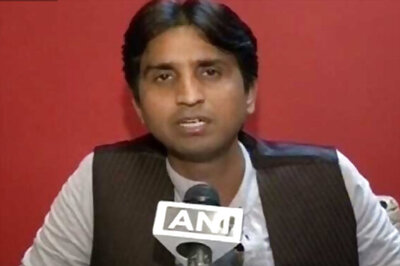
views
New Delhi: Fuel inflation hit an eight-week high in mid-June, showing price pressures persisted even before the government's recent increase in diesel prices and suggesting headline inflation in Asia's third-largest economy is headed back towards double-digits even as growth slows.
A slowdown in tax receipts, meanwhile, is weighing on India's finances, with data showing the fiscal deficit in the first two months of the year that started in April at 1.31 trillion rupees ($29.2 billion), or 31.7 per cent of the full-year target, and adding to the likelihood the government will need to borrow more.
At the same point last year, the deficit was 27 per cent of the year's target.
"It will be difficult to meet the tax receipts target. The government had set the target assuming a 9 per cent economic growth. But the economic growth is expected to be slower than that," said DK Joshi, chief economist at Crisil.
While food inflation eased to a six-week low of 7.78 per cent in the week to June 18, from 9.13 per cent a week earlier, the fuel price increase and its knock-on effects are expected to add to the case for continued tightening of monetary policy.
"This will push up headline inflation for June to beyond 10 per cent," said N Bhanumurthy, economist with the National Institute of Public Finance and Policy in Delhi, referring to the price increase.
"I don't see it sitting there in double digits for long because food and manufacturing inflation are trending downwards," he said.
Infrastructure output grew 5.3 per cent in May, slightly faster than in April. April-May output rose 4.9 per cent, from 7.9 per cent a year earlier.
Power shortages and bad roads are key drivers of inflation in India, and delays in approvals and environmental clearances have slowed project building. Infrastructure accounts for 26.7 per cent of India's industrial output.
The fuel price index climbed 12.98 per cent in the week to June 18, before the fuel price rise took effect, from 12.84 per cent a week earlier, government data showed on Thursday.
New Delhi raised prices of diesel, cooking gas and kerosene last Friday, a politically unpopular move that adds to inflationary pressure but gives relief to oil companies reeling from revenue losses on state-set fuel prices amid high global crude prices.
Standard Chartered expects the rise in diesel and other fuel prices to add 70 basis points to headline inflation.
The headline wholesale price index (WPI) inflation stood at an annual 9.06 per cent in May despite continued monetary policy tightening by the central bank, which has increased interest rates 10 times since March 2010.
The Reserve Bank of India is widely expected to raise rates by another 50 basis points in coming months, which could further erode demand in an economy that grew at 7.8 per cent in January-March, its slowest in five quarters.
Food prices, which are volatile and have been a driver of inflation in India for nearly two years, depend heavily on the summer monsoon, which began earlier this month.
"The last 10 days of June and first 10 days of July are a crucial period for the monsoon," said Sujan Hajra, chief economist at Anand Rathi Financial Services in Mumbai. "As of now, food inflation should remain in single digits," he said.
India's consumer price index, used to set government wages, rose 8.72 per cent for industrial workers in May from a year earlier, slower than April's 9.41 per cent, government data showed on Thursday.
Investor hopes that the fuel price increase would go towards easing New Delhi's fiscal burden were dashed by accompanying reductions in duties on oil products that are expected to cost the government $5.5 billion in lost revenue.
The government is targeting a deficit of 4.6 per cent of GDP in the current fiscal year.
Net tax receipts in the first two months of the fiscal year accounted for 3.5 per cent of the annual target, compared with 6 per cent a year earlier, while spending was running at 13.2 per cent of the target -- in line with last year.
The revenue secretary has said meeting revenue targets in the current fiscal year would not be easy.
Private economists have long viewed the deficit target as optimistic as economic growth slows and the government's subsidy burden persists, and traders expect the federal government to borrow far more than its budget target from the financial markets in the second half of the fiscal year.
Market participants are bracing for higher-than-planned government borrowing after September.
The government bond yield have risen steadily this week since the fuel price and duty decision, with the 10-year yield rising 35 basis points in the June quarter, its biggest quarterly rise since the December 2009 quarter.
The 10-year bond yield was around 8.33 per cent towards close of trade on Thursday. Mohan Shenoi, head of treasury at Kotak Mahindra Bank in Mumbai, expects that trend to continue and push the benchmark yield to a peak of 8.50 per cent.
"The eurozone crisis was pulling yields down, so with that problem being addressed for now, domestic concerns of at least another 50 basis points rate hike and also worries of the government not being able to meet its fiscal target are taking over," he said.
The government plans to borrow a gross 4.17 trillion rupees ($93.3 billion) from the market this fiscal year, of which 2.5 trillion rupees, or 60 per cent of the full-year target, is scheduled to be completed in the first half.
Most market participants believe the government will increase its market borrowing by 300-700 billion rupees, depending on its fiscal performance. That could be offset in part by 400-500 billion rupees of bond buying by the central bank, dealers have said.
"Duty cuts on diesel and petro products will definitely put pressure on the government's finances. It will be a challenge to meet the fiscal deficit target of 4.6 per cent this year," said Aditi Nayar, an economist with ICRA.




















Comments
0 comment